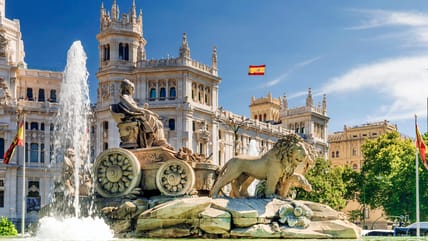It’s noon on Sunday, and the check-in area of the docked Epic Carnival Cruise ship buzzes with pre-carnival energy as I search for an outlet to charge my phone. Passengers fresh from last night’s Soca Brainwash and PINKnicTT fetes move through what Johnny Mack, CEO of Epic Carnival Cruise, calls the “first floating all-inclusive hotel” in Trinidad—my home for the next few days. When Roxi from Machel Montano’s team arrives, umbrella tilted against the glaring sun, she grabs the napkins I’ve brought for midday touch-ups with a casual “Shoot’s delayed anyway, but we’re still on time.” This marks Montano’s first album in four years, “One Degree Hotter,” and his return to carnival season—a hiatus spent earning his Master’s in Carnival Studies from the University of Trinidad & Tobago. As I join his team to Maracas Bay Village for the “Fling It Up” video shoot with Davido, the Afrobeats dynamo whose rhythms pulse through the global music scene, I’m about to witness the King of Soca’s long-awaited return.
The 40-minute drive to the village turns punishing—I experienced my first-ever bout of car sickness as we wind through emerald mountain curves that seem to fold into themselves like origami. I force myself to sleep against the nausea, waking only when the car lurches to a stop on sun-baked gravel. To my left, beachgoers wade into turquoise waves that lap against the shoreline in hypnotic rhythm. To my right, Che—the manager I’d been coordinating with since before my evening flight landed me in Port of Spain at 1:30 AM Saturday, right as the city’s biggest cultural weekend ignited—waves me toward a weather-beaten staircase leading to what appears to be a makeshift prep area.
Upstairs, Machel Montano sits regally on a stool under a striped awning, his locs tied neatly back, wearing a hot pink two-piece outfit that catches the light, gold-trimmed sunglasses perched on his nose, and a multicolored silk scarf draped over his shoulders like royal vestments. A stylist dabs his forehead with a cloth, the small gesture somehow enhancing, rather than diminishing, his aura.
“First time in Trinidad?” he asks as we shake hands, his palm warm and grip firm. “First time in Trinidad,” I say. “But I’ve played mas in Jamaica, Barbados, Grenada, St. John, even Junkanoo in the Bahamas.”
He chuckles, adjusting his scarf with a gentle gesture. “You did all those but skipped Trinidad?”
Below us, a steel pan band plays joyous calypso sounds that rise and fall with the sea breeze. Che alerts me with a subtle nod as we jet down the stairs, only to be met by a wave of gasps and shouts proclaiming “Machel, Machel” from the crowd—a ripple of recognition that quickly becomes a roar. As we pull away in our truck, I steal a glance back at the beautiful chaos. As soon as we reach a pocket of silence in the car, I press record.
“Did you always envision taking time away from music and carnival for other pursuits, or was there a point you felt constrained by your career?” I ask as we slowly glide over a bump-ridden road that seems to undulate beneath us.
“This was always a dream since 2010. I always had it aligned,” he explains, popping a cough drop into his mouth and removing his sunglasses to reveal eyes filled with unexpected candor. “There was a vision plan, and I always said that in 2020, I would take time off and really focus on what I want to do instead of feeling pulled by what I had to do to make it. I took a break in the year 2000, 2010, and again in 2020. It just happened that COVID came, and I was so happy.”
I pause from staring at my voice memos to look at his expression because… what?
I inquire if the pandemic was part of his rollout, which he laughs off, denying with a wave of his hand. “I roll with the wave, and I had the vision that some days you’re gonna need some time to retreat, and that was the perfect time for me.” Montano continues, his voice dropping to a more intimate register, “I built a house in the jungle made of wood, two years prior. I spent the first couple of months in the jungle living free, going to the beach, eating fruit, and planting my own stuff when everybody else was inside. It was really what I had always dreamt of, but then I realized that I needed to restore and work on my meditation and spirituality. I went to India.”
Urgency picks up as we arrive at the next set, the sky shifting from brilliant blue to threatening pewter. Behind a modest home structure, we find an open field of lush vegetation, pristinely carved out for what seems like this particular shoot—an emerald canvas awaiting its performers. Directors with weathered faces, stylists with nimble fingers, choreographers gesturing expressively, and dancers in feathered backpacks and full mas costumes fill the area, their sequins and beads catching what little light breaks through the clouds. They assemble in formation with practiced precision as the first drops begin to fall.
The director yells action just as Davido appears, his presence commanding immediate attention. Machel kneels to the ground, his body transforming into a conduit for the music as he performs his track while cameras swoop around him like mechanical birds. But the creative momentum doesn’t last long. As the rain increases from gentle patter to insistent drumming, the director yells cut, and everyone rushes to their vehicles, my shoes sliding against the wet terrain as we try to dodge the increasingly heavy drops that seem determined to wash away the afternoon’s plans.
Back in the vehicle headed toward Port of Spain, I’m relieved thinking I can finish some questions, only to be met by the reality of a megastar who listens to his body with monastic discipline. Cutting up some citrus, popping in cough drops that release the scent of menthol, drinking water from a steel bottle, and examining his knee—an injury he sustained in 2015—Machel connects his Bluetooth and turns on meditative sounds that fill the car with gentle chimes. I don’t fight the energy, I just take the ride, watching the landscape blur outside rain-speckled windows.
Arriving at Holy Name Covenant School for Machel’s Dimanche Gras rehearsal around 2 PM, with the sun having broken through the clouds once more, I’m left with compelling points to consider. Dimanche Gras—known as Big Sunday or Great Sunday—is a Senior Kings & Queens Final and National Senior Calypso Monarch Final competition, steeped in tradition and prestige. As he makes his biggest return with a new LP and as an official master scholar, it’s evident that immersing himself in all aspects of Trinidadian carnival matters deeply to him—even the parts that Instagram’s algorithm doesn’t deem worthy of virality.
“We’re going to throw a curve and it won’t be much longer til we can find a way to understand the true essence and purpose of Trinidad-style carnival,” Machel says, hopping out of the car with renewed energy to meet with his dancers, technicians, and props team preparing for his performance of “Bet Me,” a calypso from his newest project.
“Carnival was initially based on ritual, religion and resistance,” he makes clear, his voice taking on a professor’s precision. “It went and it was convoluted with food, frolicking and f—–g. It was drawn into the Catholic land, but if we go back and really study it, we’ll get back to why we do this. This is escapism. This is catharsis.”
The next 62 hours become a technicolor blur of sensory overload. From Dimanche Gras competition where voices soar over orchestration, to Jouvert at dawn where mud and paint transform bodies into living art, to Monday mas where revelers don form-fitting bodysuits known as “Monday wear,” to Tuesday’s official road march day—true Carnival—where we parade in full mas costumes with magnificent feathered backpacks that transform humans into walking art pieces. The schedule is manic yet transcendent. “One Degree Hotter” delivers what has been missing these last years, offering anthems that dominate the road.
“It’s so many layered meanings, but [“One Degree Hotter]” is a bridge between everything that we were and everything that we want to be,” Machel explains. “One Degree Hotter will show the knowledge I’ve gained from going back to school and my 40 years of experience, yet truly understanding the origins of carnival.”
“Pardy,” the album’s standout track, wins the official Trinidad Carnival Road March, holding thousands in its grip as it plays on repeat without a hint of crowd fatigue. As Carnival transforms the island, Machel reflects on his role: “I am the griot—the voice of the voiceless. I choose to see my work as sacred. So although I am there in a party with everybody drinking, this is serious to me. It is my responsibility.”







